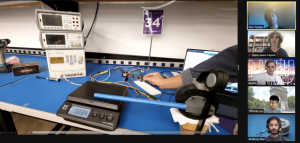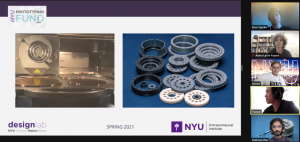Stay up to date on upcoming events, deadlines, news, and more by signing up for our newsletters!
This blog post was written by Anne-Laure Fayard and originally posted on the NYU Tandon MakerSpace blog. See the original post here.
On May 6 2021, we held our 15th Prototyping Fund Showcase (our first one was in Spring 2014 – time flies!). It was also our 3rd remote showcase. The Prototyping Fund is a collaborative program offered by the Design Lab @ NYU Tandon MakerSpace and the NYU Entrepreneurial Institute that provides teams of students mentorship and funding to build and test prototypes. To adjust to the circumstances, this spring, we had a small cohort and we kept the showcase small and interactive.
The passion and creativity of the teams has not diminished over the years. Even this semester, with most of the teams remote or hybrid, students’ ingenuity and resilience were admirable. The breadth (from aquaponics, STEM education to robots and sustainable beef jerky) and quality of the projects were impressive.
The lessons shared by the teams showed a great level of reflection and resonated with the Prototyping Fund Remit: to provide an environment to experiment and learn; to practice rapid prototyping to ask questions and iterate; to embrace ambiguity; and last but not least, to remember that collaboration is key for innovation.
See below a short description of each project.
I’m very excited to see how these ideas evolve as 4 out of the 5 teams will be doing user testing and iterate during the summer – either on their own or through the Summer Startup Sprint or Summer Launchpad with the NYU Entrepreneurial Institute.
Early this spring, Sarah Maibach, who had been my partner in crime for several years, moved on to new adventures (it was great to have her join us for the Showcase). I’m thankful to Liz New, NYU MakerSpace Assistant Manager, who joined me this spring to mentor the teams and to prototype our Fall Prototyping Fund!
Looking forward to the Fall Prototyping Fund! Stay tune for the dates.
Anne-Laure Fayard, Associate Professor of Innovation, Design and Organizational Studies, NYU Tandon; Faculty Advisor to the Design Lab @ NYU MakerSpace.
Thank you to the department of Technology Management and Innovation, NYU Tandon for sponsoring the program.
Fishel Aquaponics
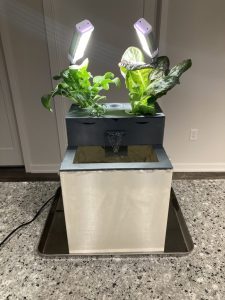
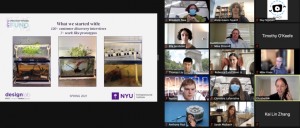
Team Members: Elizabeth Wright (GSAS ’21), Ella Jacobson (GSAS ’18)
What is it: We’re creating beautiful, easy-to-use aquaponics kits for fish enthusiasts who’d like to cut down on the time they spend changing their fishes’ water. Our kits create a self-cleaning ecosystem so that water changes are not needed.
Process: Using lessons from our work-like prototypes and customer discovery interviews, we created our first work-like-looks-like CAD model and printed it at NYU’s MakerSpace.
Top lesson learned:
To make user testing more efficient, we’ll use existing (not custom-made) tanks in our kits.
How can the NYU community help you moving forward?
We’re interested in talking with 1) fish enthusiasts who love their fish, but who’d like to spend less time on tank maintenance, and 2) people who have insight into the plastic mold injection industry.
CYOCrawler: Create Your Own CrawlerTeam members
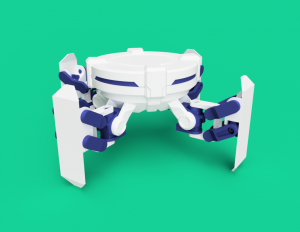
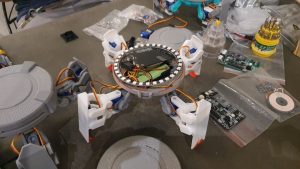
Team Members: Roxy Ho (Steinhardt '22), David Truong, Duy Nguyen
What is it: Project kits targeting technical skills from 4 areas: electrical, mechanical, software, IoT, to build up to your dream career. Making personal projects much more industry-relevant, practical and easier to start.
Process: We conducted 30 interviews to see how students are struggling with acquiring the skills necessary for their internships before senior year. We then fused those in-demand skills into project kits that are easy to start and capable of extending to higher levels. Each project kit is iterated numerous times to ensure a smooth start and exciting journey for users.
Top lesson learned:
User focused: Talking to users give us diverse and meaningful insights of how they are currently approaching the topic, their needs and wants.
Iterative design: There’s no “perfect design”. We need to keep on iterating based on user feedback and rigorous testing to make the product better.
Co-design: We want to co-design with professors and TAs to ensure the best learning experience for students.
How can the NYU community help you moving forward?
MORE “GEEKS”: We want to build a community to collaborate on building kits to bring hands-on education to more students. We are moving to our next phase: Customer discovery and user testing. If you are interested in participating, please sign up to our newsletter.
Quadruped Robot
Team Members: Xinyang (Thomas) Liu (Tandon ‘21), Austin Stenstedt (Tandon ’21), Yuewei Fu (Tandon ‘21), Eion Tyacke (Tandon ‘21), Anthony Paul (Tandon ‘21)
What is it: A 4-legged robot capable of dynamic balance and transportation of small parcels built to be more affordable than current existing 4-legged robots.
Top lessons learned:
Team dynamics and communication matter.
Start building early rather than iterating on the design. Once you start building, you learn a lot and then you can iterate.
Jackson’s Beef Jerky
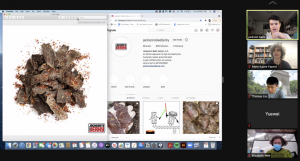
Team Members: Jackson Baris (Gallatin ‘24), Maya Peters (Tisch ‘24)
What is it: A delicious beef jerky made with grass fed beef, 100 percent organic ingredients, and without GMO’s, nitrates, and preservatives.
Grow Together
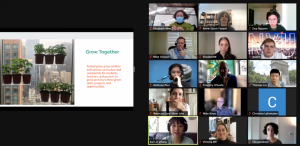
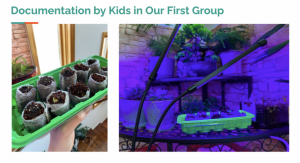
Team Members: Kai Lin (Wagner ‘21), Tim O’keefe (Tandon Faculty), Gaby Kreutzberger
What is it: A community platform and game that encourages interactivity and personal care through the maintenance of a variety of medicinal plants.
Process: We’ve created kits and provided 3 children (and families) grow kits in order to track their involvement in the growing process and how they engage our kits in order to better inform our platform design.
Top Lessons learned:
Pivoting is OK: Be ready to adjust to changes.
Rapid prototyping can help test the overall idea rather than focusing on a specific technology.




